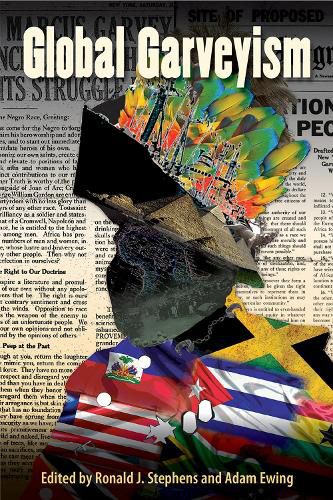Readings Newsletter
Become a Readings Member to make your shopping experience even easier.
Sign in or sign up for free!
You’re not far away from qualifying for FREE standard shipping within Australia
You’ve qualified for FREE standard shipping within Australia
The cart is loading…






This title is printed to order. This book may have been self-published. If so, we cannot guarantee the quality of the content. In the main most books will have gone through the editing process however some may not. We therefore suggest that you be aware of this before ordering this book. If in doubt check either the author or publisher’s details as we are unable to accept any returns unless they are faulty. Please contact us if you have any questions.
Illuminating the global impact of Marcus Garvey's Black nationalist philosophy Arguing that the accomplishments of Jamaican activist Marcus Garvey and his followers have been marginalized in narratives of the Black freedom struggle, this volume builds on decades of overlooked research to reveal the profound impact of Garvey's post-World War I Black nationalist philosophy around the globe and across the twentieth century.
These essays point to the breadth of Garveyism's spread and its reception in communities across the African diaspora, examining the influence of Garvey's Universal Negro Improvement Association (UNIA) in Africa, Australia, North America, and the Caribbean. They highlight the underrecognized work of many Garveyite women and show how the UNIA played a key role in shaping labor unions, political organizations, churches, and schools. In addition, contributors describe the importance of grassroots efforts for expanding the global movement-the UNIA trained leaders to organize local centers of power, whose political activism outside the movement helped Garvey's message escape its organizational bounds during the 1920s. They trace the imprint of the movement on long-term developments such as decolonization in Africa and the Caribbean, the pan-Aboriginal fight for land rights in Australia, the civil rights and Black Power movements in the United States, and the radical pan-African movement.
Rejecting the idea that Garveyism was a brief and misguided phenomenon, this volume exposes its scope, significance, and endurance. Together, contributors assert that Garvey initiated the most important mass movement in the history of the African diaspora, and they urge readers to rethink the emergence of modern Black politics with Garveyism at the center.
Contributors: Ronald J. Stephens | Adam Ewing | Keisha N. Blain | Nicole Bourbonnais | Jose Andres Fernandez Montes de Oca | John Maynard | Erik S. McDuffie | Frances Peace Sullivan | Robert Trent Vinson | Michael O. West
$9.00 standard shipping within Australia
FREE standard shipping within Australia for orders over $100.00
Express & International shipping calculated at checkout
This title is printed to order. This book may have been self-published. If so, we cannot guarantee the quality of the content. In the main most books will have gone through the editing process however some may not. We therefore suggest that you be aware of this before ordering this book. If in doubt check either the author or publisher’s details as we are unable to accept any returns unless they are faulty. Please contact us if you have any questions.
Illuminating the global impact of Marcus Garvey's Black nationalist philosophy Arguing that the accomplishments of Jamaican activist Marcus Garvey and his followers have been marginalized in narratives of the Black freedom struggle, this volume builds on decades of overlooked research to reveal the profound impact of Garvey's post-World War I Black nationalist philosophy around the globe and across the twentieth century.
These essays point to the breadth of Garveyism's spread and its reception in communities across the African diaspora, examining the influence of Garvey's Universal Negro Improvement Association (UNIA) in Africa, Australia, North America, and the Caribbean. They highlight the underrecognized work of many Garveyite women and show how the UNIA played a key role in shaping labor unions, political organizations, churches, and schools. In addition, contributors describe the importance of grassroots efforts for expanding the global movement-the UNIA trained leaders to organize local centers of power, whose political activism outside the movement helped Garvey's message escape its organizational bounds during the 1920s. They trace the imprint of the movement on long-term developments such as decolonization in Africa and the Caribbean, the pan-Aboriginal fight for land rights in Australia, the civil rights and Black Power movements in the United States, and the radical pan-African movement.
Rejecting the idea that Garveyism was a brief and misguided phenomenon, this volume exposes its scope, significance, and endurance. Together, contributors assert that Garvey initiated the most important mass movement in the history of the African diaspora, and they urge readers to rethink the emergence of modern Black politics with Garveyism at the center.
Contributors: Ronald J. Stephens | Adam Ewing | Keisha N. Blain | Nicole Bourbonnais | Jose Andres Fernandez Montes de Oca | John Maynard | Erik S. McDuffie | Frances Peace Sullivan | Robert Trent Vinson | Michael O. West